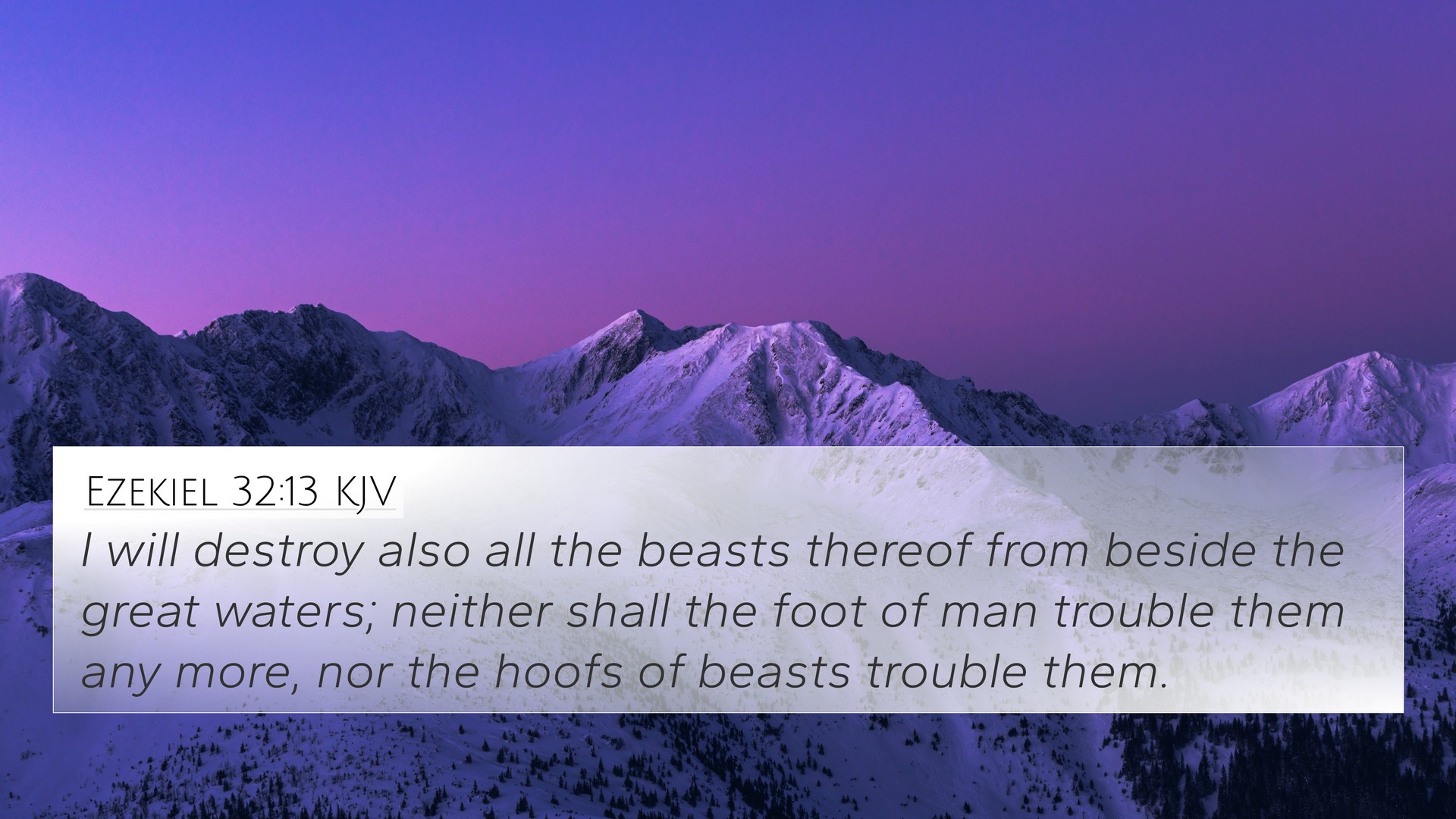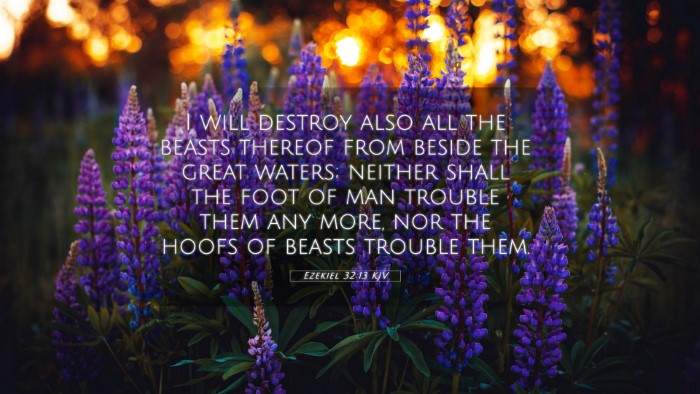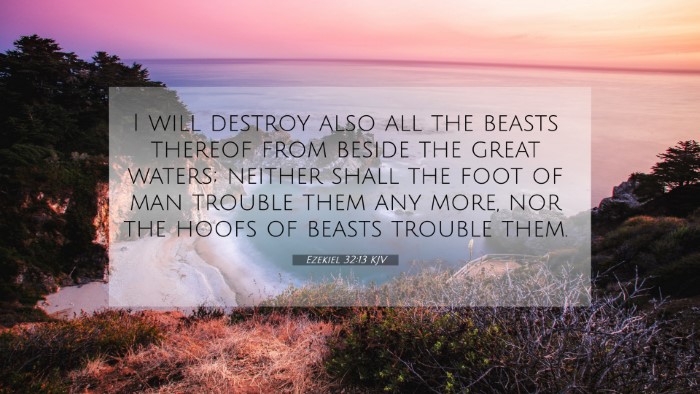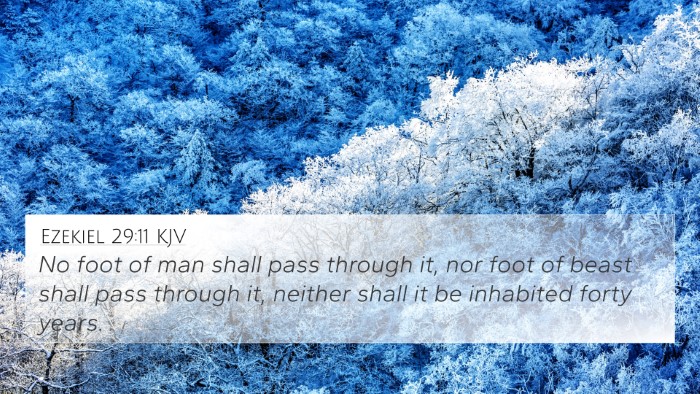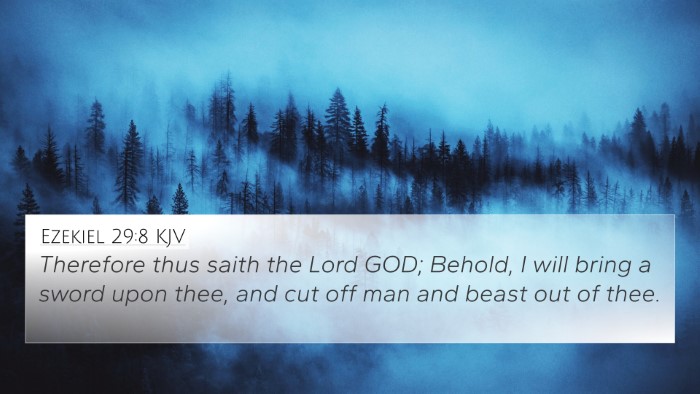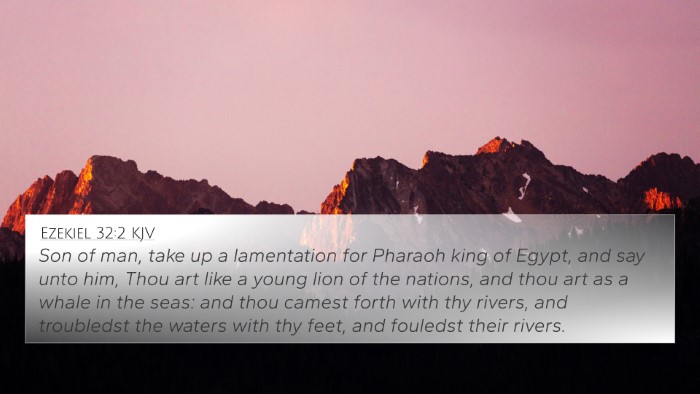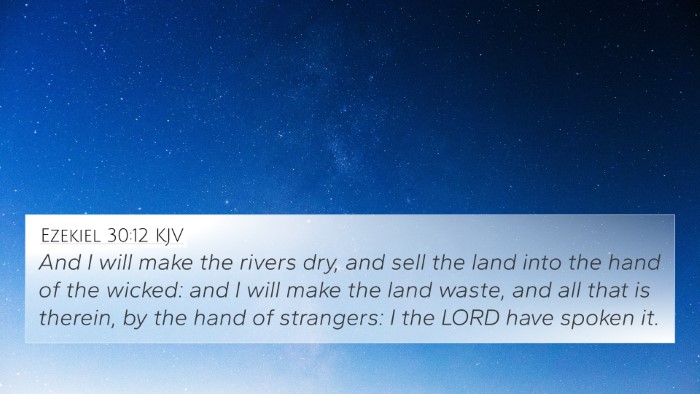Ezekiel 32:13 - Summary and Interpretation
This section provides an in-depth analysis of Ezekiel 32:13, exploring its meanings, themes, and connections with other scripture. The verse reads:
"I will also destroy all the beasts thereof from beside the great waters; neither shall the foot of man trouble them any more, nor the hoofs of beasts trouble them."
Verse Context and Meaning
Ezekiel 32:13 speaks about the desolation and destruction that God brings upon the nations, particularly in relation to Egypt. This verse emphasizes the complete eradication of life and activity around the great waters, symbolizing both literal waters and the spiritual life of the nation.
Commentary Insights
- Matthew Henry: Henry notes that God’s judgment is comprehensive; it not only affects the people but also the animals that inhabit the land. This indicates complete desolation, reinforcing the severity of the punishment due to Egypt's idolatry and rebellion against God.
- Albert Barnes: Barnes emphasizes the symbolic interpretation of "great waters." He suggests that they represent the might of Egypt and its false gods, which will be rendered powerless and lifeless after God's judgment. The absence of human and beast signifies a land returned to desolation.
- Adam Clarke: Clarke interprets the 'foot of man' and 'hoof of beasts' as representations of both human and animal activities that once thrived in Egypt. The verse serves as a stark prediction of total abandonment and the resulting silence and desolation of the land.
Thematic Connections
The themes present in Ezekiel 32:13 cross over into various biblical texts, providing a rich tapestry of inter-Biblical dialogue. Some relevant themes include:
- Judgment and Desolation: Similar to the prophecies found in Isaiah and Jeremiah regarding the impending judgment on nations.
- The Power of God: Reflects God’s sovereignty in executing His will upon nations, as narrated in books like Daniel.
- Life and Death: Highlights the importance of life in the scriptures, as seen in verses discussing the importance of spiritual life in contrast to spiritual death.
Cross-References for Ezekiel 32:13
Understanding Ezekiel 32:13 can be enhanced through its cross-references with other biblical passages. Below are some scriptures that connect thematically or contextually:
- Isaiah 19:4: Discusses the judgment on Egypt, emphasizing the loss of its power.
- Jeremiah 46:25-26: Prophecies concerning Egypt's downfall at the hands of foreign oppressors.
- Ezekiel 29:5: A prior warning about Egypt being forsaken and left desolate.
- Revelation 16:3: The pouring out of God's wrath and the destruction of the sea, paralleling the desolation depicted in Ezekiel.
- Psalms 74:15: A mention of the drying up of great waters, reminiscent of this prophecy's imagery.
- Ezekiel 30:12: Further confirmation of God’s promise to dry up the waters of Egypt, enhancing the judgment theme.
- Jeremiah 50:38: Discusses the desolation of Babylon, providing a parallel to God's judgment on nations, showing the overarching theme of divine judgment.
Understanding Through Cross-Referencing
To delve deeper into the meanings within Ezekiel 32:13, one can utilize tools for Bible cross-referencing. Here’s how:
- Utilize a Bible Concordance: Find instances of similar terms and themes to draw connections between scriptures.
- Engage in Bible Cross-Reference Guides: These resources can help link verses that may reflect unified messages or themes.
- Conduct Cross-Reference Bible Studies: Engaging with a group or individual study focusing on connected themes enhances understanding.
Conclusion
Ezekiel 32:13 serves as a profound reminder of God's judgment on Egypt, symbolizing broader themes of desolation and power dynamics in scripture. By cross-referencing this verse with others, we can see its place within the larger narrative of the Bible. Engaging in comparative Bible verse analysis enhances our understanding and appreciation of God's word.
For further enlightenment, readers are encouraged to explore biblical cross-references, employing them as tools for deeper scriptural engagement and for discovering the intricate connections that God has woven throughout His word.
